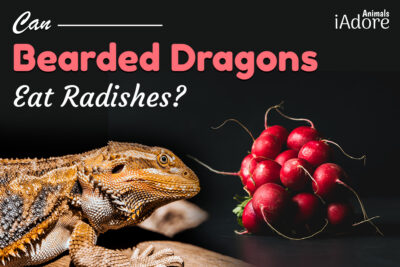Without question, spinach is a superfood for humans. We can consume spinach every day to improve our health because it is high in fiber, antioxidants, and a wide variety of vitamins and minerals. But with bearded dragons, that’s not exactly the case. If they overeat spinach, they risk becoming extremely ill or dying.
So, can bearded dragons eat spinach? How much, if at all? The good news is that spinach doesn’t have to be avoided entirely and can help your dragon when given in small doses.
Over the past few years, interest in bearded dragons has steadily grown. The inland bearded dragon is considered one of the best lizard pets. Despite their unique character, they are intriguing creatures with a reputation for being attentive, hardy, and tame, making them excellent pets.
Can Bearded Dragons Eat Spinach?
The answer is yes, but only seldom and in very small amounts.
Omnivorous bearded dragons have stringent diets. You may already be aware that your bearded dragon needs a lot of fresh fruit and vegetables, but what they require are insects. So, when trying to compile a checklist of edible foods for your bearded dragon.
The excessive consumption of spinach may be hazardous to your bearded dragon. Spinach can inhibit calcium absorption, and there aren’t many nutrients in spinach that kids wouldn’t obtain from other foods.
Because spinach has a high concentration of oxalates, they bind calcium and stop it from being absorbed, which is bad for bearded dragons.

How Often Can Bearded Dragons Eat Spinach?
A few leaves in a month is fine for the bearded dragons.
Some dragon keepers choose not to feed spinach to their pets because they don’t want to take a chance. It can also be fine as bearded dragon development is not at all dependent on spinach. However, in rare situations, spinach should be fine (a few leaves every couple of months). Of course, you should consult your veterinarian first if your beardie has underlying health issues.
It is advised not to serve a whole bowl of spinach alone but one serving of spinach every two to three months as part of a nutritious and well-balanced salad.

4 Benefits of Spinach for Bearded Dragons
1: Low Sugar Levels Make it Good for Heart
A high-sugar diet doesn’t work well with bearded dragons. In reality, excessive sugar consumption, particularly regularly, can cause fatty liver disease, diabetes, obesity, and even life-threatening heart failure in bearded dragons. Spinach is a heart-healthy addition to the occasional salad because it rarely contains sugar.
2: Healthy Calcium and Phosphorus Ratio for Your Pets
Bearded dragons should rarely consume phosphorus-rich meals, particularly those with more phosphorus than calcium. Regularly consuming meals with a calcium to phosphorus ratio of 1.1 or above, so the amount is at least balanced, is much safer for bearded dragons.
Among foods containing calcium and phosphorus, spinach has a higher calcium content than phosphorus. In terms of that crucial ratio, it is therefore safe for beardies—even advantageous. Bearded dragons could eat spinach continuously without experiencing any problems if that were the only thing we had to consider.
3: Vitamins and minerals for Overall Health
The term “superfood” applies to spinach for a reason. It contains many nutrients that people and dragons both require, including:
- Iron, which facilitates the delivery of oxygen to the body’s organs;
- Folate, which controls cell division and growth;
- Fiber, which eases digestion;
- Vitamins A, C, and beta carotene strengthen your dragon’s immune system, vision, reproduction, and growth;
- Vitamin K1 controls blood clotting.
4: Nutrients For Good Health
Other minerals, including iron, magnesium, and potassium, are also abundant in spinach. These minerals have positive health effects, including supporting bone health and growth and reducing blood pressure.
2 Risks of feeding spinach to Bearded Dragons
1: High Water Content May Lead to Diahrea
Spinach is loaded with 92% of water, like watermelon. Though it will keep the dragon hydrated, the overdose may lead to diarrhea. So, limiting the amount of spinach you offer in a month is good.
2: Oxalates and Calciums May Lead to MBD
Your dragon cannot absorb the calcium because the oxalates bond to it. It is also true that calcium is being digested concurrently from other sources.
A condition known as metabolic bone disease (MBD) can occur by food deficient in calcium and having a persistent calcium shortage.
What is Metabolic Bone Disease?
MBD is a disorder where calcium-deficient bones grow soft, weak, and distorted. It is most prevalent in younger beardies (under two years of age). A bad diet typically leads to MBD, which is excessively high in phosphorus and inadequate in calcium or vitamin D-3.
Although spinach has the ideal calcium to phosphorus ratio for bearded dragons, the oxalates mean that the calcium content may never actually be absorbed.
It makes sense why veterinarians advise against feeding this specific leafy green given the delicate balancing needed to maintain your beardie’s calcium intake.
Tannin Inhinibits Enzyme Functioning
Spinach also contains some tannin levels, which bind with the proteins, thus reducing their absorption. Tannin also hinders the enzyme functioning found in the bearded dragon gut, which is responsible for iron and vitamin B12 absorption.
How to Prepare Spinach for Your Bearded Dragons?
- Giving your beardie spinach is simple: When possible, buy organic spinach.
- To avoid pesticides or dirt entering your dragon’s body, clean the spinach properly.
- To prevent choking, chop the leaves before adding them to your bearded dragon’s vegetable bowl.
- Since raw spinach provides more nutrients than cooked spinach, cooking spinach is not necessary.
- You are welcome to include additional vegetables. It can be served on its own or combined with other vegetables, including carrot tops, bell peppers, sweet potatoes, and common greens.
- If your dragon is a picky eater who shuns greens, you may always top the salad with a few alluring pieces of sweet fruit, such as grapes, strawberries, or bananas.
- To protect your dragon, only give your beardie a tiny bit of spinach every few months.
What Other Vegetables Can Bearded Dragons Eat?
Collared Greens
The calcium to phosphorus ratio in these greens is 14.5 to 1, making them a superfood. Your dragon needs a lot of calcium and a fantastic vitamin, fiber, and folate profile.
Cactus
Once the spiky exterior has been carefully removed, you’ll have a tasty treat for your beardie. The fleshly section of Cactus, when chopped into bite-sized pieces, is brimming with calcium, vitamins, fiber, and antioxidants.
Turnip Greens
Turnip greens, another leafy green with a good calcium-phosphorus ratio, offer a little flavor to your beardie’s dish in addition to a lot of calcium and vitamins.
Turnip greens shouldn’t make up most of any dragon’s diet because they contain a lot of oxalates, and just a handful can get mixed in with other oxalate-free greens.
Dandelion Greens
Calcium and vitamin A are both found in abundance in dandelion leaves. They contain oxalates, just like turnip greens; thus, it is preferable to pair them with something that doesn’t contain oxalic acids. Take collard greens, for instance.
Mustard Greens
Like turnip greens, mustard greens can give a dull vegetable mixture a little flavor. The oxalate concentration is another element they both have in common.
Escarole
Escarole can give your beardie’s supper a bit of texture and crunch. It is a source of calcium, but because it includes some oxalic acids, it must be eaten alongside a calcium-rich, oxalate-free green.
Conclusion
Can bearded dragons eat spinach is a common question in the owners’ minds? Although spinach is healthy for bearded dragons, its high oxalate content should only be given occasionally as a treat.
The bearded dragon’s body cannot absorb calcium because of these oxalates, and over time, this deficiency causes metabolic bone disease.
Additional low-oxalate vegetable options also give your beardie the nutrients they need to stay healthy.
Your bearded dragon will remain healthy for many years with a balanced diet of fruits, live insects, and vitamin supplements.
Other Preferred Foods for Bearded Dragons
- Turnip Greens
- Zucchini
- Sweet Potatoes
- Squash
- Radishes
- Pumpkin
- Pears
- Plums
- Peas
- Peaches
- Papaya
- Mint
- Kiwi
- Silkworms
- Basil
- Bok Choy
- Alfalfa Sprouts
- Applesauce
- Arugula
- Slugs
- Asparagus
- Darkling Beetles
- Hornworms
- Crickets
- Calci Worms
- Nightcrawler
- Wax Worms
- Rolly Pollies
- Mealworm Beetles
- Roaches
- Mealworms
- Ants
- Superworms
- Grasshoppers
- Dandelions
- Flowers
- Beetles
- Spiders
- Cherries
- Potatoes
- Dragon Fruit
- Eggs
- Parsley
- Green Beans
- Celery
- Blueberries
- Earthworms
- Cantaloupe
- Broccoli
- Kale
- Cucumbers
- Strawberries
- Cilantro
- Cabbage
- Tomatoes
- Raspberries
- Pineapple
- BlackBerries
- Mango
- Carrots
- Apples
- Watermelon
- Grapes
- Bananas
FAQS
Can bearded dragons eat spinach every day?
Occasionally, it should be fine to eat spinach (a few leaves every couple of months).
Can spinach kill a bearded dragon?
Despite all these wonderful advantages, spinach has one fatal defect that bearded dragons cannot tolerate: it is highly oxalate-rich.
Can bearded dragons eat raw spinach?
Spinach is acceptable for your bearded dragon to eat in tiny amounts, but it is best to avoid it entirely.
Do beardies like baby spinach?
Bearded dragons can consume baby spinach on an as-needed basis as ordinary spinach.















